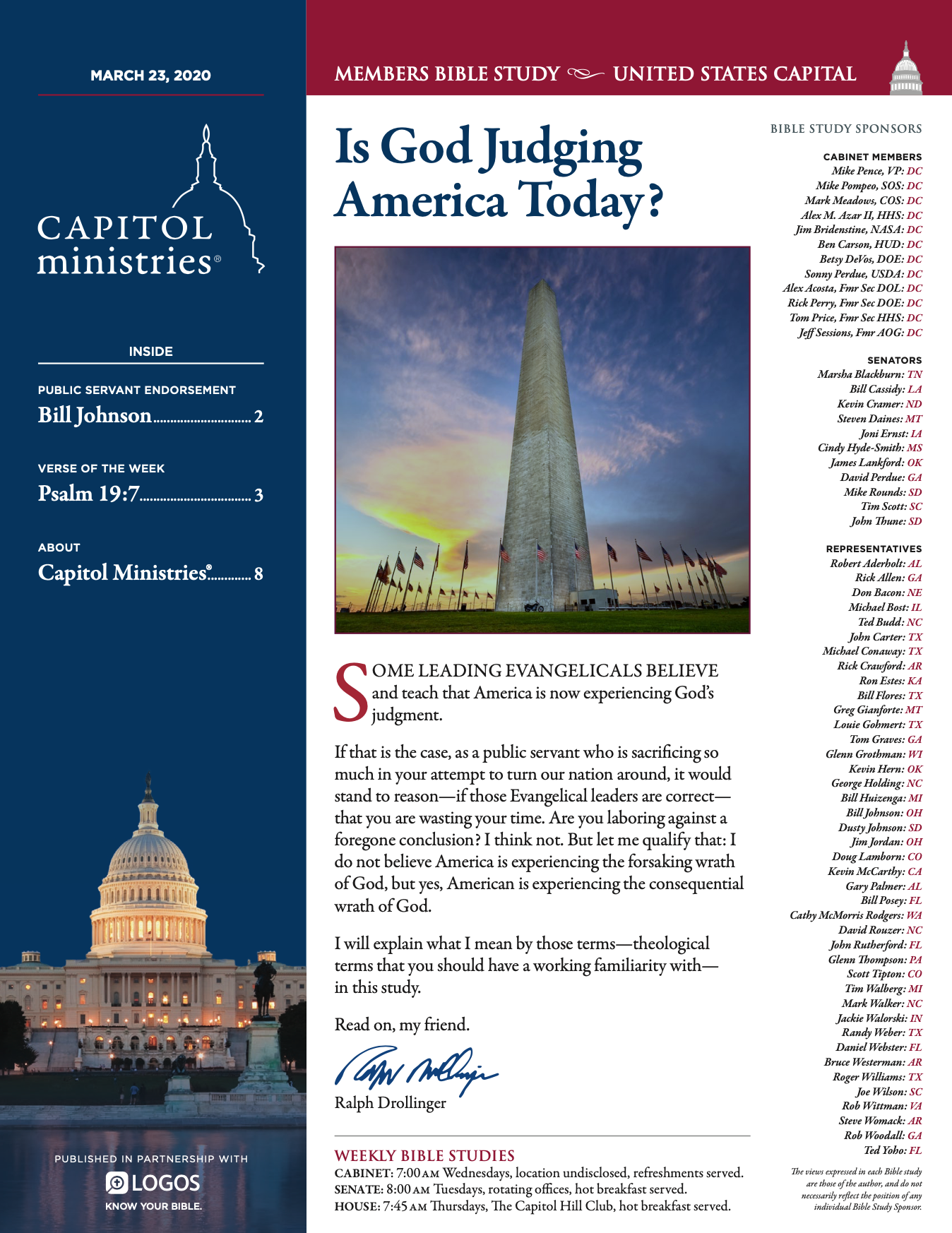
How Republican Politicians Get Schooled on the Bible
An investigation of the Bible study (and its teacher) influencing how Republican politicians understand the coronavirus pandemic
“Is God Judging America Today?” asked Ralph Drollinger in a Bible Study posted on his Capitol Ministries website on March 21, 2020, in reference to the coronavirus pandemic that was then cresting on the American shore and heartland, with 24,000 confirmed cases and 300 deaths (as of this morning, sixteen days later, the respective statistics are 337,646 cases and 9,648 deaths, rising with the hour).
Drollinger, the subject of a New York Times profile last October by Mattathias Schwartz, “How the Trump Cabinet’s Bible Teacher Became a Shadow Diplomat,” was soon taken to task in select media, first by Lee Fang in The Intercept, on March 24, “Trump Cabinet Bible Teacher Blames Coronavirus on God’s Wrath—Somehow it Involves China, Gay People, and Environmentalists.” After an outraged statement by Alphonso David, the president of Human Rights Campaign, an LGBTQ advocacy group, Brooke Sopelsa at NBC Out did a follow-up story that also included a quasi-rebuttal (via email) by Drollinger claiming that he does not in fact “believe that homosexuality played any role whatsoever in the coronavirus.” The next day, as these stories circulated, deputy White House press secretary Judd Deere reached out to Aris Folley at The Hill, stating unequivocally, “These comments are disgusting and certainly not something the President believes … The President does not attend this ‘bible class’ and they are not held at the White House.” With all the predictability left in an unpredictable time of global pandemic, Drollinger has accused his critics of “Lies, Distortions and Inaccuracies” and spreading “fake news.”

Adjudicating these conflicting claims on the evidence is critically important for such a matter of public debate, let alone when the person in question is teaching and targeting these Bible lessons to a huge cadre of leaders at the very pinnacle of our government—the Cabinet (headed by Mike Pence and Alex Azar, who are directing the coronavirus Task Force), the Senate, and the House of Representatives. Beyond that, as the graphic above shows, these politicians (every one of whom is a member of the GOP) are formal “sponsors” of this Capitol Ministries Bible Study, listed prominently on the very document we are about to analyze. There is an equivocating disclaimer in tiny font at the bottom of that page, “The views expressed in each Bible study are those of the author, and do not necessarily reflect the position of any individual Bible Study Sponsor.” But does that deflect the responsibility these sixty-four members of our United States government have from being associated with this messenger and his message?
The evidence in question on Drollinger’s teachings on God’s wrath and the coronavirus consists of a dossier that includes two blog posts, both dated March 21, one a personal letter (signed) from Drollinger, and the other a “news release” from Capitol Ministries (“The Coronavirus Pandemic: Is the World Suffering God’s Wrath?”) that quotes him in third person, and the eight-page “Members Bible Study” (dated March 23) to which both are linked. In his response to critics, Drollinger has pointed to a single statement in blogpost #2, “A biblically astute evaluation of the situation strongly suggests that America and other countries of the world are reaping what China has sown due to their leaders’ recklessness and lack of candor and transparency.” However, neither the Bible Study itself nor the cover letter even mentions China, its leadership, or their role in the spread of the virus. The “Members Bible Study” tells a different story about responsibility for God’s wrath and COVID-19 in answering the question, “Is God Judging America Today?”
The purpose of the Members Bible Study, as Drollinger clearly states at the outset, is to enter into a specific debate among evangelicals concerning the present moment. (One might reasonably ask why, if Capitol Ministries is non-sectarian and non-partisan, as it claims, an evangelical debate should be its focus in addressing a national and global crisis.) All parties of that debate share the assumption that human history and events can and should be examined in relation to what “the Bible” teaches about God’s judgment. Drollinger’s Bible Study proceeds first to argue that there are five kinds of divine judgment or “wrath” mentioned in the Bible: “1. Eternal Wrath (Hell); 2. Eschatological Wrath (The Day of the Lord); 3. Cataclysmic Wrath (The Flood, Sodom & Gomorrah); 4. Forsaking Wrath (Removing Restraint, aka The Wrath of Abandonment); 5. Consequential Wrath (Sowing & Reaping)” (box inset, p. 2). Drollinger appears to have taken these five categorizations from the prolific and influential evangelical pastor-educator John F. MacArthur in a sermon entitled “A Nation Abandoned by God” from May 31, 2007 (as reprinted elsewhere and likely reflected in other places in MacArthur’s voluminous writings). This is all the more probable since MacArthur was the founder and president of The Master’s Seminary (TMS) from which Drollinger received his M.Div. (n.b. TMS is not accredited by The Association of Theological Schools and has since 2018 been on probation with its accrediting agency, WASC Senior College and University Commission).
In that 2007 sermon, then TMS president MacArthur vehemently argued that God had indeed exacted the fourth type of wrath (Forsaking Wrath) against America: “… this massive concept of the wrath of abandonment I’m convinced is now at work in our society,” due to the “sexual revolution,” the “homosexual revolution,” and a corrupted “cultural mind.” MacArthur’s exegesis and theology are unmistakably the inspiration—and debate partner—of Drollinger’s Bible Study, which is crucial to know in order to comprehend his argument. Drollinger agrees with MacArthur that the key text for guidance in this moment is Rom 1:18-32 (not, say, the great parable in Matt 25:34-36, about caring for the sick, the hungry and isolated), and, while sharing with MacArthur the insistence that God’s wrath on America is due to “lesbianism and homosexuality” and other people with “depraved minds,” he adds a new spin—“environmentalists,” a stunning allegorical rendering of Paul’s description of Greek idol worshippers who “serve the creature rather than the creator” (p. 4, the subject of another of Drollinger’s Bible Studies that deserves careful scrutiny). Beyond this, starkly contending against his teacher, Drollinger argues that, while all these types of people are experiencing God’s “forsaking wrath,” wherein God “allows a person or a group of people to go in the way of their wicked desires” (pp. 2-3), the United States as a nation is not.
Drollinger offers this argument to reassure his audience of Republican leaders at a moment of unprecedented crisis that, “It’s not as if in your attempts to rebuild America you are going against the will of God—in the sense that you are hanging in and He isn’t” (p. 8). (Do elected and appointed officials of our government truly need to be persuaded of this point?) Beyond that, Drollinger’s message involves not just reassurance, but flattery and a form of exceptionalism—the reason God is not exacting his wrath on America today is the same one that was operative in Abraham’s debate with God about Sodom and Gomorrah, which ends with the calculus that God will not destroy the city if ten righteous persons may be found in it (Gen 18:32). “In fact to the contrary, America today is populated by tens of millions of followers of Christ!” (p. 7, punctuation original). Here it may be helpful to know that Drollinger ended his earlier Bible Study on Environmentalism with the triumphal claim that evangelicals, who believe in “multiplying and filling the earth,” have out-reproduced their opponents by six million babies in the last two decades and will soon outvote non-Christians at the polls, a form of evangelical eugenics. Drollinger teaches his select audience of our government officials that they and their like-minded citizens are the reason God has not destroyed the nation. “Abraham, if he were to plead with God for America, would have a much stronger case than he did pleading with God for Sodom and Gomorrah” (p. 7). But why, despite these numbers of faithful who satisfy the Abrahamic arithmetic, is America now at risk of any kind of divine wrath? Does the Members Bible Study publication sustain Drollinger’s subsequent disclaimer that he does not “believe that homosexuality played any role whatsoever in the coronavirus”?
In fact, it does not. The Bible Study explicitly contradicts that later, revisionist claim, not only in various sentences, but in the very logic of its argument. After going to great lengths to emphasize that God’s “forsaking wrath” is already upon, not the whole nation, but Americans who are “homosexuals,” “environmentalists,” and others with “depraved minds,” Drollinger argues that America as a nation now is suffering the effects of “consequential wrath.” This concept (partly inspired by Gal 6:7) is defined as: “If a person or a nation sows debt, it will reap in due time the results of financial crisis. Whenever an individual or corporate group of individuals violate the inviolate precepts of God’s Word, he, she, they or the institution will suffer the respective consequences. Most assuredly America is facing this form of God’s judgment” (p. 5).
At this point the argument shifts to offer “Six Biblical Reasons why America is not Experiencing God’s Forsaking Wrath” (pp. 5-7). These have nothing to do with the coronavirus in particular (which is not mentioned) but are based in Drollinger’s dispensationalist and supersessionist reading of the Bible. He seeks to argue, not just that God is not exacting “forsaking wrath” on America, but that God does not and will not bring judgment down on any nation in “the Church Age.” That Drollinger does not tarry to define this phrase shows that he expects his audience of legislators and Cabinet members to share his dispensationalist presupposition, that we are currently living in “the Church Age,” the period from Pentecost (Acts 2) until the Rapture. Drollinger does admit that in the “Old Testament” God punished nations or promised to (this model of progressive revelation and moral superiority involves a classic form of anti-Judaism), and allows that God may do so again in “the future Tribulation period” (p. 5) but not in this period of “the Church Age.” So, God is not punishing America with “forsaking wrath” because God never does punish nations in Drollinger’s sectarian periodization for the now. This is a somewhat tautological argument, for which he offers rapid-fire “Exhaustive New Testament Word Studies” of only three select Greek terms (apparently searched through Bibleworks 5.0), asserting forcefully that they never appear in the New Testament in conjunction with “the Church Age” or “judgment” on “nations.” But all these statistics are meaningless since “the Church Age” is not a phrase that is found in the New Testament, and concepts like “judgment” or “repentance” or “nation” are not solely linked to particular lexical terms. Nor does Drollinger engage the complex issue of what counted back then (in the period of the imperium Romanum) as a “nation” and what does or might count as such in the modern period of the “nation-state,” among other historical, linguistic, hermeneutical, and methodological considerations that are simply bypassed.
But, if America is not being punished with “forsaking wrath,” why is it now experiencing God’s “consequential wrath”? What has been sown so that the coronavirus is what is now being reaped? At this point Drollinger brings the two parts of his argument together: “Those individuals who are rebuked by God’s forsaking wrath are largely responsible for God’s consequential wrath on our nation” (p. 7). One can hardly imagine a clearer statement that American homosexuals, environmentalists, and others who fit Drollinger’s interpretation of Rom 1:18-32 are, in fact, the responsible party for the “consequential wrath” now being experienced by “the vast majority of faithful individuals in America” (p. 7). Not “fake news” but Drollinger’s own words say precisely this. Not surprisingly, the upshot of all this Bible Study is a promotional for Capitol Ministries and its goal to prepare “disciples of Jesus Christ in the political arena”: “I think great days lie ahead for our country as more and more Evangelicals rise in their influence—you godly public servants—who are working so hard to deliver us from the consequential wrath we are undergoing as a nation due in large part to the misdirection of those who are rebuked by God’s forsaking wrath” (p. 7, italics added to draw attention to precisely what Drollinger has later denied).
Drollinger’s surprise at the push-back against his publication is likely because he thinks his Bible Study is less condemnatory, and more hopeful than his teacher, MacArthur’s. In fact, it is not. Logically, despite the reassignment of the types of divine wrath, it amounts to the same thing: God’s wrath comes upon the nation because of some individuals, and those individuals are “homosexuals,” purveyors of “environmentalism,” and certain others. But the message has been inverted by Drollinger to instill a further sense of purpose in a quadrant of our elected and appointed leaders that they are fighting to save a nation that is suffering the “consequential wrath” of seeds sown by the presence of some of its citizens whom God has already forsaken. This is what he thinks is a proper Biblical response to a virus that is rampantly spreading across all boundaries, killing many of the most vulnerable and the surprisingly vulnerable, further endangering the poor, and placing countless lives of healthcare professionals and first responders on the line each minute. The sponsors should be held as accountable as the author of this “Members Bible Study” for the views to which they have allowed their names to be appended. ♦
Sightings is edited by Joel Brown, a PhD Candidate in Religions in the Americas at the Divinity School. Sign up here to receive Sightings via email. You can also follow us on Facebook and Twitter. The views and opinions expressed in this article are those of the author and do not necessarily reflect the position of the Marty Center or its editor.
Images: Feature image: Ralph Drollinger in Washington, D.C., October 5, 2017 (Credit: Stephen Voss); Body image: the front cover of the Members Bible Study (by Capitol Ministries) for March 23, 2020.


